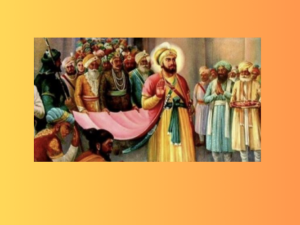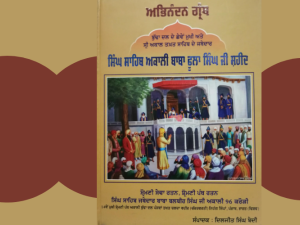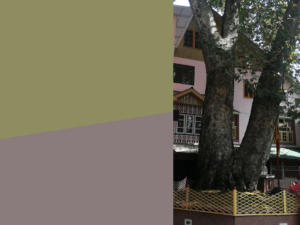" DASVANDH or Dasaundh, lit. a tenth part, refers to the practice among Sikhs of contributing in the name of the Guru one-tenth of their earnings towards the common sources of the community. This is their religious obligation - a form of seva or humble service so highly valued in the Sikh system." The concept of dasvandh was implicit in Guru Nanak's own line: "ghali khai kichhu hathh dei, Nänak rahu pachhäṇahi sei"
He alone, O Nanak, knoweth the way who eats out of what he earneth by his honest labor and yet sharreth part of it with others" (GG, 1245). The idea of sharing and giving was nourished by the institutions of sangat (holy assembly) and langar (community kitchen) the Guru had established.
Sikhs are commanded to engage in labor and distribute their earnings, as it is natural to do so. By following this principle, pride does not arise in the mind of the giver, and the receiver does not feel inferior. This unique experience of creating equality in society is the result of Guru Sahib's vision of socialism.
While Sikhs spend generously on charity and adornment, there seems to be a reluctance to extend a helping hand to fellow Sikhs who are deserving and in need of assistance, thus pulling them out of the deep ditch of poverty or ignorance.
In the light of Gurbani, it becomes clear that there is a contradiction between worship and service. Both cannot coexist in the same place; one has to choose between them. Throughout the lifetimes of the Gurus, there were multiple instances where the concept of offerings was addressed, and each time the form of offering changed to meet different needs.
During the time of Guru Nanak Sahib , there was an instruction to make offerings to support Langar and Dharamshala's (the then form of Gurdwaras). When Guru Angad Sahib took over, the focus expanded to include service for Akharas and materials for reading and writing. Guru Amardas Sahib established Manjis and appointed successors to propagate Sikhism. Sikhs were allowed and encouraged to give offerings regularly in the form of "Dasvandh" and "Masands" were appointed in various locations to facilitate the Sangat (congregation) so that Sikhs did not have to travel long distances to offer Dasvandh. Instead, they could submit it to the Masand of their area.
With this change, offerings were no longer voluntary but became a mandated tax on behalf of the Sikhs for the Guru Ghar (the Guru's House). Consequently, the tithe of a Sikh's earnings became part of the Guru's treasury rather than remaining their own. The treasury of Guru Ghar exists within every Sikh, in the form of the tithe, which is utilized by the Guru.
Contrary to this, emphasis was placed on Sikhs earning their own livelihood through labor. Sri Guru Nanak Sahib has made it clear that one can recognize the path of God only by earning their own money and utilizing it not just for oneself, but for the benefit of others. During the time of Guru Amardas Sahib , the Masand system was established for the convenience of the Sikhs, aiming to preach and collect tithes so that the Sikhs wouldn't have to face the troubles of traveling to distances to meet the Guru. The concept of tithing originated when Shri Guru Amardas Sahib Ji used the tithe to dig Baulias (wells) to fulfill the water needs of the common people and spread the message of religion. Guru Ramdas Ji further expanded on this principle by constructing serovars(ponds) and providing financial assistance to Sikhs engaging in business. Till the time of Guru Arjan Dev ji, these tasks increased considerably. Hospital, establishment of Harmandir Sahib, service to famine victims and many other works were done. During his period, people started adopting Sikhism in large numbers, and even after accepting Islam, a large number of people started adopting Sikhism, which became the root cause of their martyrdom. This great tyranny of Emperor Jahangir was made famous by Chandu's exploits by historians to get the pleasures of the government. Seeing this wave, Emperor Shah Jahan implemented the death penalty law for those who left Islam and adopted another religion. Guru Hargobind Sahib gave new orders to the Sikhs that weapons and horses should be presented. Tithe is used to keep the army, build forts and for the Gurdwaras, temples, and mosques from this fund. A mosque was built for Muslims in HarGobind Pur, a village in Gurdaspur district, popularly known as "Guru Ki Maseet". Guru Gobind Singh Sahib blessed 52 poets from this tithe fund and continued to meet their needs in life. The Sikhs were sent to Banaras in the guise of pure saints to get higher education in Sanskrit. Because Hindus did not give higher education in Sanskrit to anyone other than Brahmins and Sadhus. Apart from this, all the work of the Guru Ghar was completed from this tithe.
However, during the time of Guru Gobind Singh Sahib , many Masands became corrupt and abused their power. They started persecuting the Sikhs and kept the tithes for themselves instead of delivering them to the Guru. To address this corruption, Guru Sahib ordered Diwan Mani Ram (Bhai Mani Singh) , to gather all the Masands at Anandpur Sahib. The dishonest and guilty Masands were punished accordingly, and the major criminals were burned in boiling cauldrons. Those who were righteous, including Bhai Bakht Mal Suri, Bhai Kambo, Bhai Jodh, Bhai Durga Das, Bhai Tulsi Das Chhimba, and others, were honored with siropao. One of the Masands named Sangat, also known as Feru, had been collecting tithes and using them for the welfare of the Sangat but hadn't deposited the amount with the Guru Sahib for a long time. Guru Sahib held Sangat in high regard and bestowed the title of "Sangat Sahib" upon him. After this incident, Guru Sahib announced the end of the Masand system.
Guru Sahib emphasized that Sikhs should offer their tithes for the welfare of the community, contributing to the nation's economic, educational, and social development. However, there is a concern that excessive focus on langars, events, gold, demolishing and rebuilding buildings, and extorting money from common Sikhs is leading to a criminalization of the nation and widening the wealth gap between the rich and the poor. The message is that nations should strive to create a continuous history rather than being proud of past achievements.
It is important to learn from this incident and respect Guru Sahib's orders, ensuring that tithes are not given to the wrong hands. If the offering of your labor earnings is not spent in accordance with Guru's teachings, it is not a righteous act to give your tithe to such individuals or groups. Instead, every Sikh should consider themselves as a missionary and invest their tithe in serving the nation genuinely and truthfully.
Not only during the time of the Gurus but also during the reign of Baba Banda Singh Bahadur , Mislan and Shere Punjab Maharaja Ranjit Singh , the tithe amount was collected and used from the government treasury. During Maharaja's time, Sri Harmandir Sahib - Amritsar, Jwalamukhi Temple - Kangra, Vishwanath Temple - Banaras, Golden Mosque - Lahore, Khankhaha (place of worship) of Madho Lal Hussain, Dargah Hazrat Data Ganj Bakhsh - Lahore, Dargah Hazrat Baba Sheikh Farid Pak Patan, and many other Gurdwaras, temples and mosques were opened. Apart from this, the festivals of Sikhs, Muslims and Hindus were also celebrated together by the government, regardless of caste differences.
Sikhs contributed their tithe in the Gurdwara reform movement and many other fronts against the misuse of religious places. Sikhism is a congregational religion and according to the time, whatever the need of the congregation was felt, the Sikhs found their share of the tithe as part of the Guru's treasury. But the call of time is that today the common Sikh needs to be informed about the use of his tithe.
During the reigns of Baba Banda Singh Bahadur and Maharaja Ranjit Singh, tithes were collected and utilized from the government treasury. Numerous Gurdwaras, temples, and mosques were established, and festivals of Sikhs, Muslims, and Hindus were celebrated together. Sikhs actively contributed their tithes to the Gurdwara reform movement and other causes against the misuse of religious places. Today, it is important to inform the Sikh community about the proper use of tithes. Additionally, it is stated that other religions, such as Judaism, Christianity, and Islam, invest in the welfare of their followers, contributing to the economic, educational, and social progress of their respective nations. This highlights the need for Sikhs to prioritize following Gurbani, reading, contemplating, and meditating on its teachings rather than merely engaging in singing and chanting. Following Gurmat ideology is crucial to preserve Sikh uniqueness and identity, and blindly ignoring or tolerating actions contrary to Gurmat principles is turning one's back on the Guru.
In the past 50 years, there has been a significant focus on langars (community kitchens), centenaries, kirtan events (devotional singing), nagar kirtans (religious processions), and trips to Gurudwaras (Sikh temples) with spiritual experiences. Some Gurdwaras have embellishments such as gold decorations, including a golden golak in one of them. For instance, the flower (spear) of the Nishan Sahib of Shri Akal Takht Sahib is made of 18 kg of gold. However, it is important to note that the weapons used in Sikhism are made of iron, which is the strongest metal, rather than gold, which is a weaker metal. While significant amounts of money have been spent on infrastructure, such as marble, genite, reservoirs, and roads leading to Gurdwaras, there are concerns about the allocation of funds.
Hostility towards Sikhs has been a longstanding issue since the inception of Sikhism. Historical names and markers have been erased, and there have been instances of misusing funds meant for Sikh welfare. Furthermore, there is a disturbing trend of burning Gurmukhi literature under the pretext of respecting Gurbani (Sikh scriptures). While these actions are claimed to be conducted under the auspices of the Shiromani Committee, it is crucial to address these concerns. The preservation of Sikh literature is vital, as neglecting it may lead to its eventual loss. It is essential for Sikhs to reflect on their actions and strive for genuine religious practices, including promoting education and the use of the Gurmukhi script.
Contrary to the preservation efforts seen in other nations, there is a disproportionate emphasis on constructing new Gurdwaras in India, rather than safeguarding historical Sikh sites. It is worth noting that the Punjabi language expansion and progress of the Punjabi language can be observed in Pakistan, where it thrives globally. It is spoken fluently in Pakistan, but it is written in the Urdu script called Shahmukhi.
In contrast, Gurmukhi, which is considered the script of the Sikhs, faces hostility in India. There has been a lack of opposition to such impositions. It is crucial to recognize the need for preserving Gurmukhi and raising awareness about its importance.
The number of people proficient in Gurmukhi is declining while instances of burning Gurmukhi literature are increasing. Significant amounts of funds meant for Sikh welfare are being spent on activities contradictory to the Sikh ideology. This poses a challenge to the Sikh community. Throughout history, societies and governments have made efforts to suppress and uproot Sikhism, yet it has continued to flourish. However, in recent times, there has been a psychological warfare against Sikhs, which requires the nation's full awareness. The Sikh community faced severe repercussions when they raised their voices against the Emergency of 1975. The Akal Takht Sahib, a significant Sikh religious institution, was systematically targeted, leading to divisions within the Sikh community. It is essential to avoid further bloodshed and suffering by addressing these ongoing challenges faced by Sikhs.
Different religions have their own practices when it comes to preserving and distributing literature. Christians, for instance, have translated the Bible into numerous languages and engage in distributing literature as part of their preaching efforts. However, it is important to note that literature can also face opposition, as some may choose to burn it along with their tithes.
In Islam, followers are commanded to pay Zakat, which is a portion of their annual savings, as well as Fitra, a charity given on the day of Eid, to assist needy Muslims. These contributions are not meant for mosque construction or salaries of mosque staff. Similarly, Christians also donate a tenth of their earnings to support missionaries and their preaching activities. This financial support aims to promote their religion and potentially convert individuals to Christianity, while also assisting new Christians in achieving higher societal positions.
Judaism, a religion with a history spanning thousands of years, has faced hostility from both Christians and Muslims throughout its existence. Tragically, millions of Jews were martyred, including six million in the Holocaust under Hitler's regime. In 1948, Israel was established as an independent country and became the homeland for Jews. During this process, a substantial amount of money, one billion US dollars, was paid.
Regarding the significance of wealth, a religious leader once provided a memorable response when offered a large sum of money for a place of worship. He stated that God is the owner of the entire world, emphasizing the insignificance of the money compared to God's dominion. Instead, he suggested using the funds to educate Jews in the fine arts, which contributed to the remarkable number of Jewish Nobel Prize winners and their continued philanthropic efforts.






